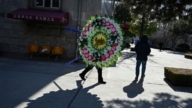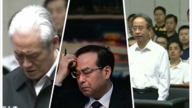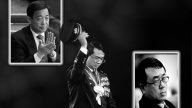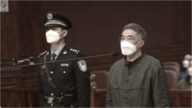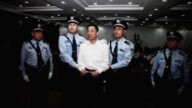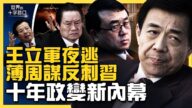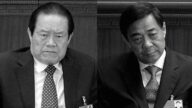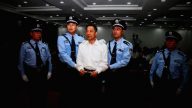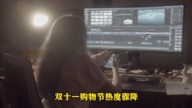【新唐人2012年4月3日訊】在中共日趨白熱化的內鬥之中,軍隊站在哪一邊顯得至關重要。「王立軍事件」發生後,大陸當局頻頻要求軍隊「堅決聽從胡錦濤指揮」。軍界高官也不斷表態效忠。最近,有德國媒體談到,胡錦濤很可能在卸任中共總書記之後,至少繼續擔任軍委主席兩年。而分析認為,中共當局並不是一個民眾授權的合法政府,現在胡錦濤想要留任軍委主席,是為了保護自己和繼續執行胡溫路線。下面請看本臺記者的報導。
近來,《解放軍報》連續發表文章,要求軍隊「堅決聽從黨中央、中央軍委和胡主席指揮」。3月27號的一篇文章特別強調:「如果不緊繃講政治這根弦,就可能在錯綜複雜的政治鬥爭面前迷失方向,就可能在個人進退去留面前患得患失。」
《德國之聲》中文網評論認為,這段話是在暗示「權力鬥爭正在北京上演」。報導還談到,胡錦濤成功拿下前重慶市委書記薄熙來之後,有望在中共18大上維持黨內地位,很可能在卸任中共總書記後,繼續擔任中央軍委主席,直到2014或2015年。
對此,時事評論員文昭分析指出,中共當局並不是一個民眾授權的合法政府。因此,在中共內部傾軋當中,不可能採用司法裁決和國民公投這種現代文明社會的仲裁程序,那麼作為暴力工具的軍隊就成為取勝關鍵。
文昭:「一講不通了,沒辦法講理了,所有的程序不行了,我把坦克開上街,我把你的人全部抓起來,我不跟你講理了。我有這個實力的時候,他就會勝出。因為這個是共產黨社會的一個特點。」
在此之前,媒體曾經報導,前重慶市委書記薄熙來和現任政法委書記周永康,密謀染指中共最高權力。薄熙來為達目地,竭力在軍隊中培植自己的勢力。比如,他入主重慶後,不斷拉攏成都軍區高層。「王立軍事件」後,薄熙來還特意前往昆明,拜訪他父親薄一波的舊部——解放軍第14集團軍。
外界認為,近來中共對軍隊不斷喊話——「聽從指揮」,與薄熙來試圖收買軍方來挑戰中央有關。《中國事務》主編伍凡表示,因為軍隊過去是歸江澤民管,現在胡錦濤要把軍隊全部轉到胡這邊來。
據分析,1999年,前中共黨魁江澤民不顧其他政治局常委反對,一意孤行鎮壓法輪功,在鎮壓失敗後,江澤民懼怕被清算,於是在高層大量安插周永康等積極迫害法輪功的「血債派」人馬,並在換屆後留任軍委主席一職。
伍凡認為,現在胡錦濤也要留任軍委主席,是為了保護自己和繼續執行胡溫路線。
伍凡:「現在就有人要把他打倒了,那他以後還不擔心別人來打他嗎?只要有共產黨存在,這批極左派的人一定是存在的,他們一定會反對鄧小平路線,反對胡溫這條路線的。即便是胡溫下去了,這條路線﹙極左派﹚還存在,它當然還要反對你﹙胡溫﹚呀。」
《解放軍報》的文章還警告軍隊,世界形勢、國內、黨內形勢發生了深刻變化,中共面臨許多新挑戰和危險。
伍凡:「就是不喜歡你共產黨了。整個世界經濟下滑了,老百姓生活不好了,軍隊待遇不好了等等都出來了,所以他就不喜歡你共產黨。在這個情況下共產黨拚命要掌握軍隊,不要給軍隊推翻掉,涵義就在這裡。」
伍凡強調,軍隊裡面的人越來越不喜歡共產黨那一套,連一些高級將領都在主張軍隊國家化,拒絕當中共的看門狗。所以,中共才不斷向軍隊施壓,要求軍人絕對服從指揮。
採訪/劉惠 編輯/李謙 後製/李若琳
Analyst: Hu Seeks to Control the Army
and Secure Hu & Wen Policy
As the infighting inside the Chinese Communist Party (CCP)
becomes heated, the army’s support is deemed crucial.
After the Wang Lijun Incident, the regime has on repeated
occasions required the troops to “resolutely obey the command of Hu Jintao”.
The army’s top leaders have also constantly
renewed their pledge of loyalty to Hu.
After retiring from the post of CCP general secretary,
Hu Jintao is expected to stay on as Chairman of the
Central Military Commission for at least another two years,
according to German media reports.
Analysts say that since the CCP is not a legally
elected government, Hu’s intention to stay on as military head is his means of protecting himself
and of assuring the continued implementation
of the Hu & Wen policy in China’s government.
The Liberation Army Daily, the official newspaper of
the CCP’s Central Military Commission(CMC), recently pledged it’s loyalty to Hu Jintao.
In its continuous articles, the official media has required
that the army
“resolutely obey the commands of the Central Committee,
the Central Military Commission and of Chairman Hu.”
An article dated March 27 especially stressed:
“Without emphasizing the need to be politically-minded,
one may lose direction in a complex political struggle,
and also might be in danger of being swayed by considerations
of gain and loss when having to make decisions as to whether to advance or retreat.”
The Chinese edition of Voice of Germany thinks that
this quotation is a clear hint that “a power struggle is being staged in Beijing."
Hu Jintao is expected to maintain his position within the CCP
after succeeding in axing Bo Xilai, Chongqing’s CCP Secretary.
Hu is very likely to continue to serve as CMC Chairman
until 2014 or 2015 after he retires as the CCP general secretary, says the comment.
Commentator Wen Zhao points out that the CCP is not
a democratically elected government.
Therefore when infighting breaks out, the regime is unable
to resort to any form of judicial process or national referendum.
Therefore, for the factions within the CCP, the army,
as a tool of violence, will be the key to obtaining final victory, says Wen Zhao.
Wen Zhao says that: “Once there’s no way of reasoning with
the other side, and when all other means have been exhausted,
the strength of the CCP may be in rolling tanks onto the streets,
and even arresting all members of the other faction.
When force is used, the winning side shall swiftly be determined.
This is a well known feature of communist society."
Not long ago, Bo Xilai and Zhou Yongkang were reported to
have had an ambitious plan to seize power from the CCP’s top leaders.
Zhou is the current secretary of the CCP
Politics and Law Committee.
Bo had reportedly tried to secure his own power
in the military.
One example was Bo’s repeated attempts at hooking in
the leadership of the Chengdu Military Region after he began his reign in Chongqing.
After the Wang Lijun Incident began to unfold, Bo visited
the 14th Army Group in Kunming with specific intentions, according to reports.
The 14th Army Group of the People’s Liberation Army
was formerly under the command of Bo Yibo, Bo Xilai’s father.
According to outside comments, the CCP’s frequent
demand that the army “obey commands"
is deemed to be a response to Bo Xilai’s buying over
the army in order to challenge the Central Committee.
Wu Fan, chief editor of the magazine China Affairs, points out
that the troops were formerly controlled by Jiang Zemin,
and that Hu Jintao has now managed to grasp power
over the military.
Reportedly, former CCP leader Jiang Zemin was confident
about waging a persecution against Falun Gong in 1999
despite a majority of opposition from all the other members
of the Politburo Standing Committee.
Seeing the failure of his persecution and fearing the eventual
punishment for his crimes,
Jiang had promoted a large number of members of
his own group to powerful positions in government.
This group consisted of Zhou Yongkang and other active
persecutors of Falun Gong, who have been labeled “the blood-debt clan”.
Jiang stayed on as the Central Military Commission Chairman
after he stepped down in the leadership transition in 2002.
Wu Fan points out that Hu Jintao is now also intent on keeping
his position as head of the Central Military Commission.
Hu aims to protect himself and also to assure the continuation
of the Hu & Wen policy into any future government.
Wu Fan continues: “Now that he has encountered
an attempt to topple him from power by others,
is it a surprise that he should be afraid of suffering
the same fate in the future?
As long as the CCP exists, left-wing extremism won’t
disappear altogether from government.
The extremists will surely oppose the line of Deng Xiaoping
and of Hu & Wen.
Even if Hu and Wen retire from their posts, left-wing will
always exist and will continue to oppose the Hu & Wen policy.”
The article in the Liberation Army Daily has warned the army
that the situation in the world, in China and inside the CCP has undergone profound changes.
The article states that the CCP is facing many
new challenges and new dangers.
Wu Fan tells us that: “This is telling us that the CCP
isn’t welcomed.
The entire world’s economy has slowed down,
people’s lives have become much harder.
The army’s remuneration isn’t acceptable, and so on.
A variety of problematic situations have presented themselves.
This shows us that the CCP are unsympathetic…
they just don’t like us.
In this scenario, the CCP is desperately attempting to control
the army, to avoid being overturned. That is the inner meaning (of the official article)."
Wu Fan stressed that military personnel have increasingly
been uncomfortable with CCP policies.
There are even some senior generals who have advocated the nationalization
of the army and have refused to be the CCP’s watchdog.
Wu Fan thinks that this is why the CCP has kept up the
pressure on the army, requiring that it’s personnel absolutely obey the commands of the leadership.


